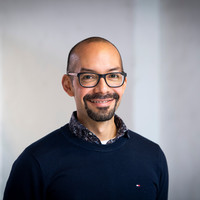Researcher of the week – Erik Flores-García
Once a week a researcher presents themselves based on four generic questions related to Industrial Transformation. This weeks researcher is Erik Flores-García, PhD, Postdoc in Production Logistics.
Why is the industry's transformation to meet climate change in a competitive manner important to you?
The transformation of industry to meet climate change is important for me because of its dual goal. Firstly, industry is asked to remain competitive against a backdrop of increased diversity, customization, and market competition. Secondly, industry cannot depend on current manufacturing practices that come at too high an environmental cost. The idea of increasing industrial competitiveness and meeting climate change goals is counter intuitive, and requires innovative solutions, joint research efforts from diverse fields, and close partnership with the industry. As a researcher in department of sustainable production development, contributing to this dual goal is a privilege and a responsibility.
How are you contributing to the transformation?
My work focuses on the use of simulation and the development of Digital Twins in production logistics. My current work includes questioning how these technologies may help reach economic, social, and environmental sustainable solutions in factories. This type of work helps our research group understand the problem of industry’s transformation to meet climate change, and locate research opportunities that generate an impact on society. I believe research should be impactful, and that the results of research should include a direct benefit to the industry and society. Therefore, part of my current work also involves locating funding opportunities to targeting the use of simulation and Digital Twins in sustainable production development.
What do you hope to have achieved with your research in 10 years?
The joint area of simulation and sustainability presents enormous opportunity. We have only began to understand all that is required in terms of preparing students, increasing the competence of working professionals, moving forward our current understanding, and developing cross disciplinary and technology-based solutions targeting industry’s transformation to meet climate change. I hope that my work may contribute to actionable results that provide a direct benefit to the industry.
What do you wish KTH to contribute with in regard to competitive industry transformation?
There is an increased need for research to communicate its findings and importance beyond academic circles. Therefore, KTH may contribute in three key areas including strong world renowned research, education of engineering students, and reaching out to the general public with interesting, plainspoken, and accessible research.
- Organizational
- Triple Helix (research, education, public service)
- Institutional vision and mission for sustainable development
- Cross departmental directive
- Industrial transformation platform
- Visibility (internal / external)
- What, why, who, when, and how?
- Requirements
About Researcher of the week
Any questions about Researcher of the week? Please email to: researchers-indtrf@kth.se.


